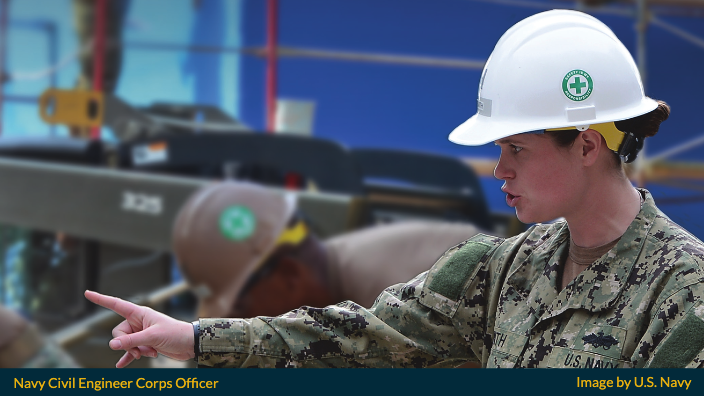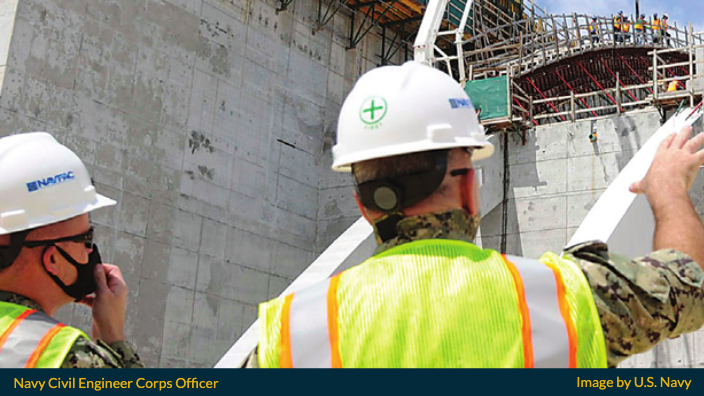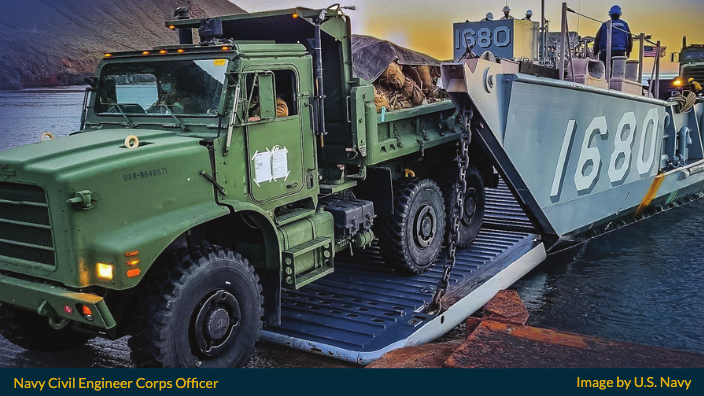This guide provides current information that will help you with your decision to become a Navy Civil Engineer Corps officer during Fiscal Year 2025.
Think engineering is just about buildings and blueprints? Think again. In the Navy, Civil Engineer Corps (CEC) Officers operate where concrete meets combat readiness—constructing runways on remote islands, managing billion-dollar base upgrades, and leading troops with hardhats instead of helmets.
If you’re eyeing a career with technical authority, global mobility, and real leadership at the edge of logistics and infrastructure—this one’s got your name on it.
And despite the name, the Civil Engineer Corps includes professionals beyond civil engineering such as architects and various engineering specialists.
Let’s break it down, piece by piece.
- Job Role and Responsibilities
- Work Environment
- Training and Skill Development
- Physical Demands and Medical Evaluations
- Deployment and Duty Stations
- Compensation, Benefits, and Lifestyle
- Career Progression and Advancement
- Qualifications, Requirements, and Application Process
- Is This a Good Job for You?
- More Information
Job Role and Responsibilities

Navy Civil Engineer Corps Officers are Staff Corps Officers who manage multi-million-dollar construction contracts, lead engineering units around the world, and maintain critical operational continuity across the Navy’s infrastructure, including ports, airfields, utilities, and expeditionary bases.
Daily Tasks
This role isn’t about working from behind a desk all day. Expect a heavy mix of oversight, technical engagement, and real-time problem-solving:
- Direct construction planning, budgeting, and execution across base infrastructure projects.
- Supervise the repair and lifecycle maintenance of airfields, piers, barracks, and critical systems.
- Negotiate with civilian contractors while enforcing government procurement and contract law.
- Provide engineering consultation to commanding officers during operational planning or deployments.
- Lead both military Seabees and civilian engineers under your command in garrison and field environments.
Specific Roles and Career Identifiers
The CEC community consists of highly distinct operational specialties. Each falls under the broader 510X Navy officer designator, but your path can diverge quickly based on mission alignment and training pipeline:
| Primary Role | Officer Designator | Subspecialty Code (SSP) | Notes |
|---|---|---|---|
| Contract Management | 510X | 1100 | Directs acquisition and fiscal oversight for engineering contracts. |
| Public Works / Facilities Ops | 510X | 1101 | Manages base infrastructure, energy, and environmental systems. |
| Naval Construction Force (Seabees) | 510X | 1102 | Operational engineering leadership in deployed or expeditionary contexts. |
Designators and subspecialty codes are assigned based on billet and qualification, not preference. Officers may rotate between these based on mission needs.
Mission Contribution
Without infrastructure, operations don’t happen. CEC Officers enable combat readiness by:
- Delivering strategic basing and logistics infrastructure on time, even in austere regions.
- Maintaining and upgrading facilities that house, feed, fuel, and train Navy and Marine Corps forces.
- Providing critical engineering leadership during humanitarian missions, disaster recovery, and combat support.
Technology and Equipment
The job pairs technical fluency with hands-on execution. You’ll operate:
- AutoCAD, GIS, and BIM tools to design and map out facilities.
- Scheduling and cost-estimating software for managing construction phases and budgets.
- Heavy construction equipment and surveying instruments when operating with the Seabees.
- Sustainability platforms for energy management, waste reduction, and LEED-based renovations.
Some assignments fast-track access to emerging DoD tech in smart base integration, renewable energy infrastructure, and advanced expeditionary engineering systems.
Work Environment

Setting and Schedule
For active duty Navy officers in the Civil Engineer Corps, the office might be a clean command center—or a mud-caked tent near a newly leveled airstrip. There’s no single work setting. One month you’re at a desk managing fiscal compliance; the next, you’re on-site in Guam leading the construction of fuel depots or airfield runways.
Expect both ends of the operational spectrum:
- Garrison Assignments: Standard duty hours (Mon–Fri), mainly administrative and strategic.
- Field Environments: Long hours, high tempo, and irregular shifts—especially overseas or during joint-force construction efforts.
Schedules flex hard around project timelines and mission demands. Weekend work, short-notice TDYs (temporary duty assignments), and urgent engineering crises are part of the reality.
Leadership and Communication
CEC officers are mission owners—not just paper pushers. From your first billet, you’ll be responsible for real budgets, real people, and real outcomes. That means leading mixed teams of enlisted Seabees, civilian engineers, and subcontracted labor—often with competing timelines and limited resources.
Communication happens fast and in layers:
- Upward: Through engineering duty officers and commanding officers—technical updates, risk reporting, budget needs.
- Downward: To crew chiefs, contract reps, and enlisted teams executing the job.
- Laterally: With architects, environmental officers, and outside vendors.
Performance feedback is routine, formal, and consequential. Your fitness reports (FITREPs) evaluate technical judgment, leadership performance, and your ability to deliver results on time and on mission.
Team Dynamics and Autonomy
You’re in charge—but not alone. As a junior officer, you’ll be guided, but not coddled. You’ll carry immediate authority over personnel and contracts worth millions. The Navy expects quick judgment and clear thinking—even from O-1s.
The breakdown typically looks like this:
- Junior Officers (ENS–LTJG): Assigned senior mentors, but control daily execution and field operations.
- Mid-Grade Officers (LT–LCDR): Expected to operate with minimal oversight, supervising entire divisions or installation-wide projects.
- Senior Officers (CDR+): Strategic leaders, managing regional portfolios, supervising hundreds, or serving in joint roles.
Team structure shifts by location. In expeditionary settings, you may command a Seabee detachment directly in the field. At a major base, you’re running a public works department with 24/7 facility operations.
Job Satisfaction and Retention
Here’s the truth: CEC officers stay in because they’re doing real work. You’re not buried in abstraction. Your airfields launch jets. Your seawalls protect billion-dollar assets. Your projects enable force projection.
High satisfaction drivers:
- Clear impact on mission readiness.
- Early leadership authority—especially compared to civilian engineering jobs.
- Broad exposure to fields like construction law, energy management, and logistics.
Retention can vary. Long hours and family disruptions (especially during extended field work or deployments) push some to leave. But the Navy offsets this with career progression, travel, elite training, and job security most civilian engineers won’t touch.
Training and Skill Development
Initial Training
Becoming a Civil Engineer Corps Officer in the U.S. Navy doesn’t start with blueprints—it starts with transformation.
Every officer candidate begins with two major schools:
- Officer Candidate School (OCS): 13 weeks in Newport, Rhode Island. Candidates are drilled in military bearing, chain of command, naval law, physical fitness, and foundational leadership. It’s more than marching—it’s indoctrination into the values, pace, and discipline of naval service.
- Civil Engineer Corps Officer School (CECOS): Roughly 16 weeks in Port Hueneme, California. Think of this as your professional launchpad. Here, new CEC officers are introduced to military construction, base facility management, Seabee operations, and Navy-specific contracting law. Learning isn’t passive—field exercises, planning simulations, and decision games are embedded from Day 1.
Video by the U.S. Navy
Training Takeaways at Entry Level:
- Understand how to run a public works department.
- Get certified to supervise Navy construction contracts.
- Learn to lead both civilian teams and Seabee units in garrison or field environments.
Advanced Skill Development
Once you’re through your first tour, the Navy doesn’t put your development on autopilot. It intensifies it.
Mid-career CEC Officers receive targeted education aligned with their next billet. Training is rotational and tailored:
- Expeditionary Engineering: Focuses on contingency construction, logistics support, and deployed operations with Marine or joint forces.
- Contracting & Acquisition: Formal schooling to certify you in federal procurement systems, essential for officers managing billion-dollar projects.
- Environmental & Energy Programs: Officers headed toward base infrastructure or environmental compliance roles take specialized short courses tied to emerging policy and tech trends.
In between duty stations, you’ll cycle through technical refreshers and short-courses hosted at CECOS and other DoD institutions. This is mandatory upskilling—not optional fluff.
Real-World Learning (OJT)
Classrooms teach fundamentals—actual tours teach consequence.
On-the-job training is the spine of career readiness in this community:
- Run your own construction project as an O-1.
- Sign off on hazardous material disposal as an O-2.
- Rebuild runway systems for a forward-deployed base as an O-3.
Everything you do as a junior officer directly impacts your qualification for more advanced billets. This isn’t shadowing—it’s hands-on command.
Professional Certification Pathways
The Navy doesn’t just allow professional licensing—it encourages it. Officers are actively supported in earning:
- Professional Engineer (PE) licensure
- Project Management Professional (PMP) certification
- Defense Acquisition Workforce Improvement Act (DAWIA) credentials
Many CEC officers complete these before their second tour. The Navy provides study time, fee assistance, and official leave days for exam windows.
Physical Demands and Medical Evaluations

Baseline Readiness Standards
There’s no such thing as a desk-only officer in this role. From base inspections to deployed build-outs, the physical expectations never drop. Before you even commission, you’ll need to pass the Navy’s Physical Readiness Test (PRT)—and keep passing it every six months.
PRT Requirements – Minimum Passing Scores (Age 17–19)
| Event | Male Minimum | Female Minimum |
|---|---|---|
| Push-ups (2 min) | 42 | 19 |
| Forearm Plank | 1:05 | 1:05 |
| 1.5-Mile Run | 13:30 | 15:30 |
These are just the minimums. Officers are expected to score well above them.
Show up out of shape, and your pipeline stalls. Fall behind while serving, and your command fitness report takes a hit—which directly affects promotion and billet eligibility. This isn’t a job where the uniform hides anything.
Daily Physical Demands
Fitness here is not theoretical. Field assignments, project oversight, and travel-heavy roles demand:
- Hours on foot across unpaved or industrial terrain
- Long-range walking with gear and protective equipment
- Frequent exposure to heat, noise, and unstable work zones
- Carrying equipment or inspecting elevated/foundation sites
Your day might start with a command brief and end inspecting fencing in 100° heat on gravel. Flexibility and stamina are operational assets.
Body Composition Standards
The Navy enforces strict body composition rules to sustain operational health across the force. If you fail height/weight, you go through:
- Circumference Test: Measures your abdominal circumference.
- Body Fat Calculation: Based on age and gender, with limits at 26% for males and 36% for females.
- Failure Cycle: A failed BCA results in a failed Physical Fitness Assessment cycle. Repeated failures can end careers.
No exceptions—officers are held to the same standard as enlisted personnel. And yes, it’s enforced.
Medical and Swimming Qualifications
Before commissioning, you’ll be medically screened head-to-toe. That includes:
- Full vision and hearing check
- Heart and respiratory function
- Mental health and cognitive screening
Color blindness is allowed in this role. What’s not? Anything that limits your ability to lead from the front, adapt under pressure, or deploy when called.
You’ll also be required to pass the Third Class Swim Test, which covers:
- A deep-water jump
- A 50-yard continuous swim
- A five-minute prone float
- Coverall inflation (using your uniform for flotation)
Miss the swim qual: You don’t commission until you pass.
Deployment and Duty Stations

Where You’ll Serve—and Why It Matters
There’s no single version of this job. Depending on your billet, you could be managing a multimillion-dollar utilities overhaul in San Diego—or running a forward Seabee detachment building roads in East Africa. The spread is that wide.
What determines where you go? The Navy’s operational needs, your qualifications, and—occasionally—your preferences. Officers submit duty station requests through a detailer, but those requests land somewhere between suggestion and hope. If you’re needed in Okinawa to oversee logistics upgrades, you’re going.
Types of Assignments
Your rotation will cycle through a mix of command environments:
- Public Works Departments (PWDs): Shore-based billets at major installations. Focus is on facilities sustainment, energy management, environmental compliance, and base-wide repairs. You’re managing, planning, and leading—but not deploying.
- Construction Battalions (Seabees): These are operational. Expect pre-deployment workups, field exercises, and time away from home. As a Seabee officer, you lead real-world construction operations under expeditionary conditions.
- Special Project Roles: These include stints at Naval Facilities Engineering Systems Command (NAVFAC) headquarters, joint task forces, or staff engineering billets in theater-level commands. Some are deployable. Some are strategic. All are competitive.
Deployment Cycles
Deployments are most common while serving with construction battalions. These typically follow a 12-month home station / 6-month deployment rhythm, though durations flex based on mission scope.
Most common locations:
- Pacific: Okinawa, Guam, Diego Garcia
- Europe: Rota, Spain
- Detachment Sites: Mobile projects across South America, Africa, Southeast Asia
These aren’t warfighting deployments—they’re infrastructure and logistics force-multipliers. But they’re still austere. Temporary tents. Bad weather. Tight timelines.
You don’t just lead the build—you live with the crew.
Stateside and Overseas Billets
Even outside deployments, officers are rarely static. You’ll rotate every 24–36 months, sometimes switching coasts or continents. Example path:
- Public Works Officer – Camp Lejeune
- Seabee XO – Gulfport, Mississippi → Deployed to Rota
- Staff Engineer – NAVFAC Pacific
Some roles involve frequent travel without formal deployment. Inspections, facility assessments, or emergency response can take you OCONUS (outside continental U.S.) with 72 hours’ notice.
Compensation, Benefits, and Lifestyle
Base Pay and Allowances
Your starting pay depends on your rank and time in service—but it grows fast. Every officer receives a blend of taxable base pay and tax-free allowances, structured to support readiness and mobility.
2025 Officer Base Pay Table (Select Ranks)
| Rank | Years of Service | Monthly Base Pay |
|---|---|---|
| O-1 | < 2 years | $3,998.40 |
| O-2 | 2 years | $4,606.80 |
| O-3 | 4 years | $6,247.20 |
Notable Allowances (Monthly):
- BAH (Housing): Adjusts by location, rank, and dependent status. Example: $3,639/month for O-1 w/ dependents in San Diego.
- BAS (Subsistence): Flat rate of $320.78 for officers.
- Special Pays: Deployment, hardship duty, and sea pay apply under qualifying conditions.
- Initial Uniform Allowance: One-time issue for outfitting at accession.
Unlike civilian compensation, BAH and BAS are not taxed—boosting net income significantly.
Healthcare, Housing, and Education Benefits
Navy officers are covered from the first day on orders. The benefit structure supports long-term service and family stability.
- TRICARE Prime: Full medical and dental coverage. Dependents included. Costs are negligible under active-duty status.
- BAH or Government Housing: Choose between off-base allowance or on-base housing—subject to availability and location.
- Tuition Assistance: Covers up to 100% of eligible tuition. Most officers use this to pursue advanced degrees before or during mid-career assignments.
- Post-9/11 GI Bill: Transferable to dependents after meeting minimum service requirements.
Retirement and Long-Term Security
The Navy’s Blended Retirement System (BRS) delivers long-term stability while allowing flexibility.
- Pension: Earned after 20 years. Calculated as 2% × years of service × average of highest 36 months of base pay.
- TSP (Thrift Savings Plan): Government automatically contributes 1% of base pay, with up to 5% matching after 2 years.
- Veterans Benefits: Access to VA healthcare, home loans, disability compensation, and educational support upon separation.
The system favors those who serve long enough to retire, but also gives early-exiting officers retirement savings they can keep.
Leave and Work-Life Stability
- 30 Days Paid Leave Per Year: Earned at 2.5 days/month. Max rollover is 60 days.
- 12 Weeks Paid Parental Leave: Available to all qualifying service members.
- Holiday Recognition: Federal holidays are observed in most shore billets. Deployed units adjust based on operational tempo.
- Between-Tour Reset: Most officers get weeks of permissive and block leave between PCS moves or after deployments.
Officers in shore-based roles often maintain consistent schedules. Operational billets (e.g., Seabee deployments) introduce longer hours and less predictability—but also increase pay and billet competitiveness.
Career Progression and Advancement
Career Ladder: From New Officer to Command Authority
You enter as an Ensign. That’s the starting point—but not the destination. Advancement in this community is both timeline-driven and performance-gated. Your career will move fast early, then get competitive. Below is a typical progression path for active duty officers in this track:
Typical Career Milestones
| Rank | Time-in-Service | Typical Role |
|---|---|---|
| Ensign (O-1) | 0–2 years | Assistant Public Works Officer, Platoon CDR |
| Lieutenant JG (O-2) | 2 years | Deputy Division Officer, Seabee Detachment |
| Lieutenant (O-3) | 4 years | Division Officer, Deputy Project Manager |
| Lieutenant CDR (O-4) | 10 years | Company Commander, Public Works Officer |
| Commander (O-5) | 15+ years | Executive Officer, Construction Battalion |
| Captain (O-6) | 20+ years | CO, NAVFAC Region or Joint Engineering Staff |
This is not a lock-step system. Miss a promotion board—or land a poor fitness report—and that upward momentum stops cold.
What Drives Promotion
Promotions through O-3 are mostly time-based. After that, it’s all about selection boards. These boards don’t just look at job titles—they dissect your impact:
- Did you lead a Seabee company during deployment, or just fill a garrison role?
- Did your project come in under budget and ahead of schedule—or collapse mid-cycle?
- Are your fitness reports top-tier, or do they just meet standards?
You’re measured against your peers, not your position.
Billet Rotation and Career Shaping
Most officers rotate every 24 to 36 months. Your early tours will bounce between shore and operational billets:
- First Tour: Assistant Public Works Officer (shore)
- Second Tour: Seabee Platoon Commander (deployable)
- Third Tour: Facilities Engineer at major installation
- Fourth Tour: Staff planner, NAVFAC or CECOS instructor
This rotation builds range—technical depth, field leadership, acquisition knowledge. Stagnate in one type too long, and your promotability tanks.
Education and Certifications
The Navy pushes for academic and professional growth. Not because it’s a checkbox—but because your billet demands it.
- Graduate School: Officers typically attend a fully-funded master’s program by their 8–10 year mark. Most go to Naval Postgraduate School. Degrees focus on engineering, construction management, or regional planning.
- Professional Licensure: PE licensure isn’t optional for top roles. It’s expected. Without it, advancement into high-scope billets is unlikely.
- JPME: Officers headed toward O-5 and above need Joint Professional Military Education. It’s a requirement for certain command and joint billets.
Command Track vs. Specialist Track
Not everyone commands. Some officers move toward technical, acquisition, or facilities leadership instead. That’s fine—but it must be deliberate.
- Command-Track Officers will pursue Seabee command tours and lead major projects in theater.
- Technical-Track Officers often lead NAVFAC programs, energy programs, or serve as program managers in CONUS.
You don’t get both. Specialization comes with tradeoffs.

Qualifications, Requirements, and Application Process
Minimum Qualifications
To enter this officer pipeline, you’ll need more than a diploma and a pulse. Entry is competitive, criteria are explicit, and waivers are rare.
Basic Entry Requirements
- Citizenship: Must be a U.S. citizen.
- Age: Must be at least 19 and not older than 36 at the time of commissioning.
- Waiver possible up to age 42 on a case-by-case basis.
- Education: Must hold or be actively completing a qualifying degree in engineering or architecture. Acceptable programs include:
- ABET-EAC–accredited engineering degrees
- NAAB–accredited architecture degrees
- ABET-ETAC degrees with EIT or PE certification
- GPA: Minimum cumulative GPA of 2.7.
- Waiver considered between 2.5–2.7 with strong credentials.
- Officer Aptitude Rating (OAR): Minimum score of 45 (waiverable to 40). Recommended Study Prep Guide.
- Interview: Must be interviewed and recommended by a CEC Accessions Officer.
- Medical: Must meet physical standards for sea duty and expeditionary assignments.
Pathways to Accession
There are two primary entry routes. Your timeline and academic status determine which applies.
Direct Accession
- For candidates with a qualifying degree or within three months of graduation.
- Ship to Officer Candidate School (OCS) directly.
- Appointed as Ensign upon graduation from OCS.
Collegiate Program
- For students within 18 months (24 if exceptional) of completing their degree.
- Enlisted in active duty status as an Officer Candidate (E-3 to E-5).
- Advanced in paygrade yearly while enrolled and promoted upon graduation.
- Requires maintenance of full-time status, a 2.7 GPA, and compliance with a pre-approved degree completion plan.
Waivers and Exceptions
Rarely granted—but possible if your background includes strong technical experience or licensure.
Waiver Categories
- Age: Considered up to age 42 for exceptional applicants.
- GPA: Considered for 2.5–2.7 with supporting credentials (PE/EIT/RA).
- Education: Considered for degrees not fully aligned if combined with licensure or relevant field experience.
- OAR Score: Considered below 45 with recruiter justification.
All waiver requests must include formal documentation and undergo multiple command endorsements.
Selection Process
Applications are reviewed by board. Packages must include:
- Academic transcripts
- High OAR score
- Completed interview evaluation
- Letters of recommendation (1 required, 3–5 encouraged)
- Resume or CV (for non-traditional applicants)
Immediate select status is available to fully qualified applicants with:
- Minimum 3.0 GPA
- No more than three Cs in STEM coursework
- OAR score ≥ 49
- Highly recommended interview rating
- No waiver requirements
If selected, you’ll receive a final medical screening, then orders to OCS or enrollment into the collegiate program.
Initial Rank and Obligation
- Commissioning: All selectees are commissioned as Ensigns (O-1), designator 5100.
- Service Obligation: 4 years active duty minimum, 8 years total (remaining time may be completed in the reserves).
Collegiate candidates who fail to commission may be reassigned to enlisted duty or administratively separated depending on cause.
Source: Program Authorization 104 (Jul 2024)
Is This a Good Job for You?
Who Thrives in This Role
This isn’t a position for engineers who want to stay in the lab or behind a screen. Officers here build infrastructure under operational pressure. The right fit isn’t just smart—it’s resilient, mission-oriented, and situationally flexible.
Ideal candidates have:
- A strong technical mindset paired with leadership instinct
- Comfort operating in both command briefings and construction zones
- A realistic tolerance for stress, ambiguity, and shifting priorities
- A career orientation—not just a job-hopper mentality
This is not the right fit if you want location predictability, a pure technical role without people management, or low-tempo lifestyle.
Work-Life Balance Reality Check
You’ll get routine in shore billets. But Seabee and deployed assignments can flip that. Expect:
- Long duty hours during project surges or deployment workups
- Weeks or months in austere field conditions
- Mid-career PCS moves every 2–3 years
That said—shore tours provide regular hours, access to base amenities, and the structure to support family life and off-duty education.
What Makes This Job Rewarding
- Early leadership with real budget, personnel, and mission impact
- Global mobility and the ability to physically point to what you’ve built
- Guaranteed pathway to graduate school, certification, and retirement
- A peer group that’s tightly knit, technically sharp, and mission-driven
Unlike most engineering jobs, what you lead here gets built. Under budget? You get recognized. Ahead of schedule? It shows up on your fitrep. The feedback loop is tight, and the stakes are real.
More Information
To learn more about program eligibility, commissioning timelines, or billet availability, contact your local Navy Officer Recruiter and request an information session with a Civil Engineer Corps Accessions Officer.
For academic credential evaluation, refer to ABET or NAAB program directories. Questions regarding program waivers or board selection timelines should be directed to the CEC Community Manager via your regional Navy Talent Acquisition Group.
You may also be interested to read these:
Hope this was helpful as you plan your career.

